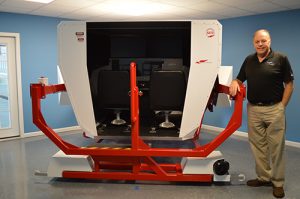
WEST OCEAN CITY – A new full motion flight simulator is expected to benefit students at a local flight school.
Earlier this month, Ocean Aviation Flight Academy took ownership of a Redbird FMX Full Motion Flight Simulator, located within the company’s new simulator lab.
President and CEO Michael Freed said the training device offers the academy’s 50-plus students a new teaching tool as they work to obtain a private or commercial pilot’s license or instrument rating.
“It’s rated as an Advanced Aircraft Training Device,” he said in an interview this week. “With that, it allows us to do a lot more with it and allot more time than a basic flight training device.”
Freed said his efforts to acquire a Redbird simulator began eight years ago, when he attended a meeting at the company’s headquarters. Earlier this month, after years of wishing and waiting, the device was delivered and installed within a newly constructed simulation classroom.
Officials say the simulator provides realistic training experiences. While students will continue to do most of their training in an aircraft, they can now refine their skills in the simulator.
Freed added that some maneuvers, like takeoffs and landings, are easier to understand when first experienced in a simulator.
“They spend a lot of time repositioning the airplane to do it again and again …,” he said. “In the flight simulator, they can do the same thing … we can back it up three miles out and put them right back again.”
For instrument flight training, he said, the device can simulate different types of weather scenarios.
“We can put them in the clouds, we can put them in severe rain storm, we can put them in a snow storm,” he said.
Ocean Aviation students have already begun incorporating the simulator into their flight training curriculum. The device, Freed noted, also allows students to log flight hours as they work toward their license or instrument rating.
For example, students earning an instrument rating can log up to 16 flight hours in the simulator, while those earning a commercial rating can log up to 50 hours in the simulator.
Freed said the device is expected to save both time and money, as it does not require the use of an airplane or fuel. It also allows students to train during bouts of bad weather.
“If they are in that phase of training, we can put them in the simulator,” he said, “so they can continue instead of waiting for the weather to break.”
Freed said Ocean Aviation’s acquisition of the Redbird simulator highlights the company’s growth in recent years. What started 14 years ago as a small operation, Freed said, now attracts flight students both near and far.
In 2009, Ocean Aviation gained FAA Part 141 approval, which sets stricter FAA standards and reduces the number of required training hours. Since that time, the flight school has also been approved to train U.S. veterans under the Veterans Administration veterans benefits and to accept international students under the federal government’s SEVIS program. Freed. noted the academy has had clients from France, China and Guyana, to name a few.
“We’ve come a long way,” he said. “And it’s not me. It’s the team we have here, from the office manager to the flight instructors to the mechanic that work on the airplanes.”
Freed said the addition of the Redbird simulator demonstrates the academy’s eagerness to expand and improve. He encouraged anyone interested in flight training at Ocean Aviation to visit flyoceanaviation.com or call 410-213-8400.
Ocean Aviation – which was acknowledged as one of the Distinguished Flight Schools in 2019 – operates year-round, Freed said. Graduates fly professionally for many of the largest airlines.
“As we grow, we are trying to keep up with that growth,” he said. “I can envision a lot of things happening here.”

